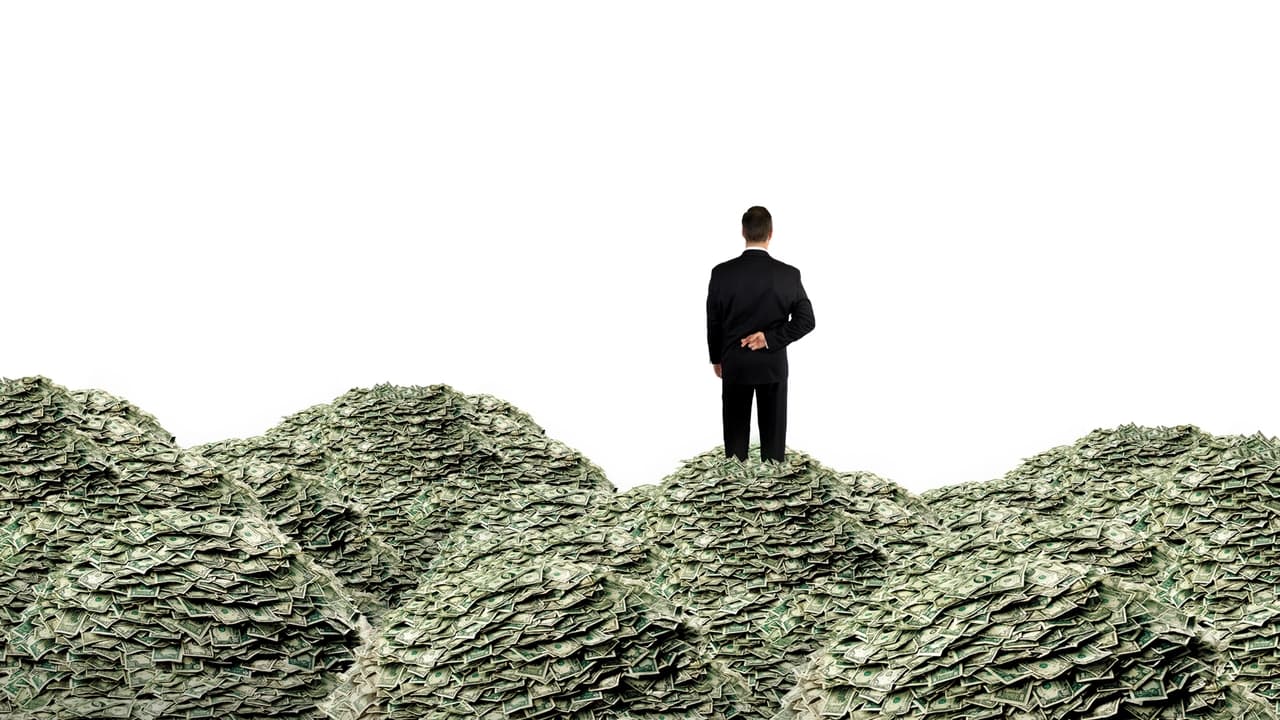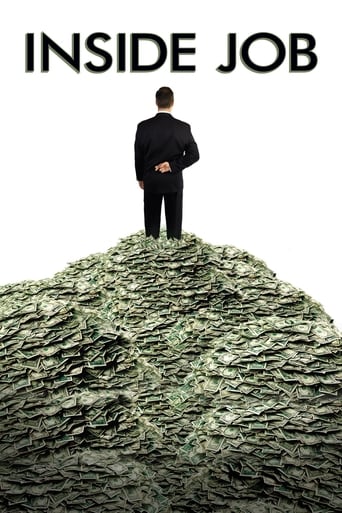

The documentary covered the analysis of financial crisis from the perspective of various stakeholders: Investment banks, The Government and Federal Regulatory bodies. It also covered how academia are supporting false publications and hence teaching at top business schools. An eye opening documentary.
... View MoreQuick look at the DVD-case cover, and even the small intro, doesn't give much value to wait for.But when the film gets into business it becomes great, awe-inspiring with its straight ahead, courageous, disciplined, civil, but also unbending handling of the subject matter.
... View More2 days ago I've watched an HBO movie called "Too big to fail" about what happened during the 2008 financial crisis. I thought the bankers/traders and those CEOs were naturally selfish but still okay. Now after watching this documentary, it seems to portray that they're all real a**shole. The film is very well-made and carefully walks through important anecdotes of the recent financial crisis. It essentially says that the crisis were the faults of a few big players in financial sectors, namely big investment banks and their CEOs, rating agencies, politicians/officers, as well as prominent academics in Economics and Finance field. Though there are a few comments that I'd like to point out about this film.Firstly, the film portrays negative picture on everyone who were involved or ever made an inaccurate judgement about the financial situation. As one might have known that it is very difficult to predict what's going to happen with the economy in the future. I believe that some of blames were quite unjust. Those people could also be wrong with their predictions and analysis. It's quite unfair to make them look like bad guys there.Secondly, regarding conflict of interests for academics and CEOs, this documentary seems to assume that everybody can be brought. Thus, once they have any past relationship or get paid to study something, they would to be biased. Does it mean that if they happen to once work for private sector, they should never make a switch and work for government. Then the government officers will only have people without experience in private sector to do the job at all. Also for the academics, as I understand, it is quite a normal practice for academic to study something with the fund provided by private sector. But what they should do is that they need to make it clear who funds the study and they should still be impartial on their academic work..
... View MoreWhen I first saw Charles Ferguson's Inside Job, I got lost in its concepts, its economic jargon, and its lengthy, drawn-out explanation of the 2007-08 financial crisis North America, and pretty much the world, was impacted by. After a semester of AP (advanced placement) Macroeconomics under my belt, I return with the idea that I think I know anything and everything about macroeconomics, the economy, and approach Inside Job with more of a knowledge about its terms. This is the kind of film that is reminiscent of one of those social clubs downtown where, if you try to jump in with no background knowledge as to what some of the basics of the club are, you're going to be lost in the shuffle.The film attempts to explain to the average person - who bears some understanding of the American macroeconomic system - why the last few years have been painful, why the recovery has been lengthy and ostensibly nonexistent, and why the financial crash occurred in the first place. I won't begin to try to summarize it here for several reasons: it could spawn a plethora of confusion, the explanation, even in a simple sense, deserves its own separate blog post, and that's what the film is for in the first place.I will say that the film's main point of why we entered such a crippling recession in the first place was because of banks marketing heavy loans to people they knew couldn't afford them. The loans were called "subprime loans," and even the issuers of the loans were betting against the casual American investor who bought into the scheme. Millions defaulted on their mortgage payments and their loans, and as a result, the housing market crashed and we were left with millions in a dire financial turmoil.The field of economics is, in my opinion, alienating beyond belief, because, much like science, it seems every single sentence in an article bears three or four words you don't understand. When trying to find definitions on those words, you are lost and wayward in trying to find the meaning of other words that were given in the definitions of the words you initially didn't understand. To top it all off, even on the news, you hear about murder, drugs, suicide, war, terror, the weather, and so on - everything that seems much more active and interesting than hearing that "the DOW dropped 'x' amount of points today." Inside Job attempts to cut through that alienation and, in turn, makes complex ideas accessible to the general public. Furthermore, the film details how during the time of the massive economic downturn, the field of economics lost a great deal of credibility because economists decided to write false reports and deliver false ideas on the economy's progress and current state for others, all working to swindle the common American investor and work for only ones personal gang. It's a cruel and unusual truth that, as a result, put a damper on an unbelievably valuable field that teaches one how to conserve and utilize current resources.The only concern of my was the way the film was edited, which seemed to be geared towards giving some people less opportunity to speak. Some interviews are cut off right after a question is asked, which usually happens after one of the talking head economists says something stupid. One thing I'm beginning to notice about documentaries is how editing plays a big part in the message they convey, and I couldn't help but feel that editors Chad Beck and Adam Bolt cut out crucial additional material that would've further shed light on certain circumstances, rather than stopping at one of the economist's poorly-worded answers.If anything, the film goes on to illustrate the idea that there is no one you can't trust but yourself in today's world. The Wall Street brokers and investors couldn't care less about you, as they spend a hefty part of their salaries and your investments on high-end hookers, drugs, and Girls Gone Wild tapes, the economists want to work in lockstep with those giving them the biggest kickbacks, and even the wealthy CEOs of banks we've all heard of can orchestrate large schemes but still can barely answer a simple question without fumbling the words. It's a frightening world we live in nowadays, one that, despite more awareness to many social issues and one that tries to emphasize safety, is still extremely reckless in many respects.Inside Job, in a documentary's sense, is one big, angry, well-stated argument that makes an attempt to clarify all the information one needs to know about the financial crisis and even attempts to place blame on the individuals that apparently caused such a crisis. It's a hefty goal for itself, and the film really shouldn't succeed as well as it does. However, through clarity, a brisk-pace, and the ability to give us a clear indication on why this film impacts each and every one of us deserves praise that should simply not be shortchanged. It's an important picture; arguably the most important you'll see in a specific year.Narrated by: Matt Damon. Directed by: Charles Ferguson.
... View More